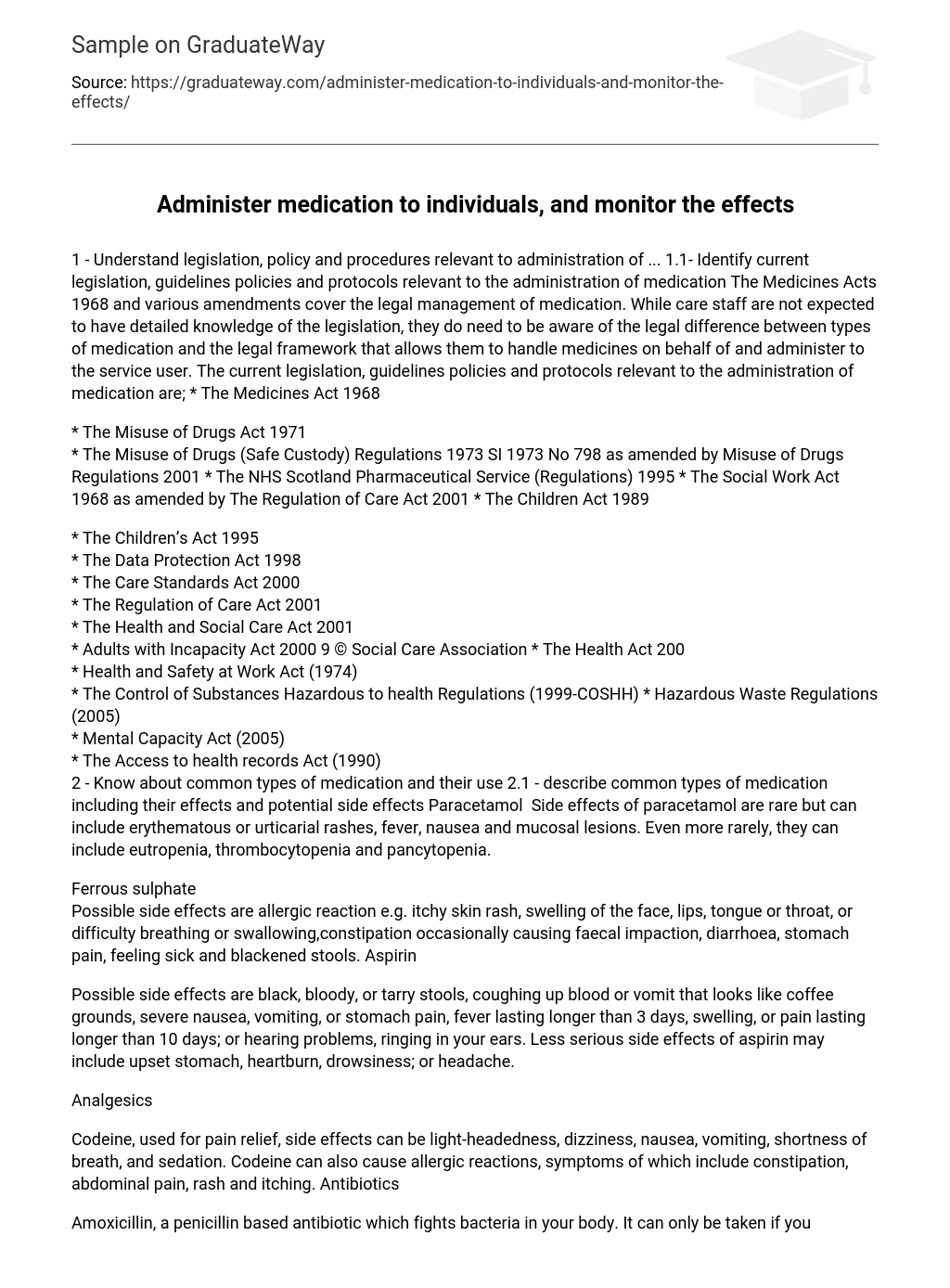One must identify current legislation, guidelines, policies, and protocols that are applicable to the administration of medication.
The Medicines Acts of 1968 and its subsequent amendments establish the legal framework for medication management. While care staff do not require extensive knowledge of these laws, it is important for them to grasp the legal distinctions between various types of medication and the overall structure that enables them to handle and administer medicines for service users. The following are the existing legislation, guidelines, policies, and protocols concerning medication administration:
- The Medicines Act 1968
- The Misuse of Drugs Act 1971
- The Misuse of Drugs (Safe Custody) Regulations 1973 SI 1973 No 798 as amended by Misuse of Drugs Regulations 2001
- The NHS Scotland Pharmaceutical Service (Regulations) 1995
- The Social Work Act 1968 as amended by The Regulation of Care Act 2001
- The Children Act 1989
- The Children’s Act 1995
- The Data Protection Act 1998
- The Care Standards Act 2000
- The Regulation of Care Act 2001
- The Health and Social Care Act 2001
- Adults with Incapacity Act 2000 9 © Social Care Association
- The Health Act 200
- Health and Safety at Work Act (1974)
- The Control of Substances Hazardous to health Regulations (1999-COSHH)
- Hazardous Waste Regulations (2005)
- Mental Capacity Act (2005)
- The Access to health records Act (1990)
Provide a summary of different types of medication, detailing their impact and possible adverse reactions.
Paracetamol
Paracetamol may lead to infrequent adverse reactions such as erythematous or urticarial rashes, fever, nausea, and mucosal lesions. In more uncommon instances, these side effects may encompass eutropenia, thrombocytopenia, and pancytopenia.
Ferrous sulphate
The use of aspirin may result in various side effects. One potential reaction is an allergic response, which manifests as a skin rash along with itching, swelling of the face, lips, tongue or throat, and difficulty breathing or swallowing. Another possible effect is constipation that can lead to faecal impaction. This condition may produce symptoms such as diarrhoea, stomach pain, nausea, and dark stools.
The potential side effects of aspirin may include the following:
- Black, bloody, or tarry stools
- Coughing up blood or vomiting substances similar to coffee grounds
- Severe nausea, vomiting, or stomach pain
- Fever lasting longer than 3 days
- Persistent swelling or pain for more than 10 days
- Hearing problems accompanied by ringing in the ears
Additionally, there can be less severe side effects such as upset stomach, heartburn, drowsiness, and headaches.
Analgesics
Codeine is a pain relief medication that can cause various side effects. These may include feeling light-headed, dizziness, nausea, vomiting, difficulty breathing, and drowsiness. Additionally, codeine has the potential to trigger allergic reactions such as constipation, abdominal pain, skin rash, and itching.
Antibiotics
Amoxicillin is a penicillin-based antibiotic that fights bacteria in the body. It is suitable for individuals without allergies to Penicillin and who have no asthma, liver or kidney disease, or history of diarrhea from antibiotics. This medication effectively treats various infections including ear infections, bladder infections, pneumonia, and salmonella. However, it can cause certain adverse effects such as mouth sores, fever, swollen glands, joint pain, muscle weakness, severe blistering and peeling of the skin with a red rash. Additional potential side effects include yellowed skin or eyes, dark urine coloration confusion or weakness; easy bruising; and vaginal itching.
Anti-hypertensive
Lisonopril is a medication used to lower blood pressure, treat congestive heart failure, and improve survival rates after a heart attack. However, individuals with liver or kidney disease, diabetes, or rheumatoid arthritis should avoid taking this medication. Possible side effects of Lisonopril include dizziness, reduced urine output, bloating, flu-like symptoms, irregular heartbeat, chest discomfort, skin rash, low mood,vomiting,and diarrhea.





